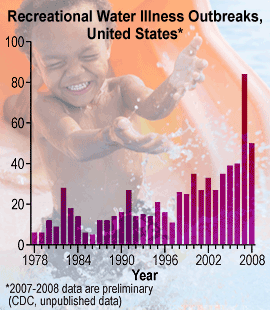Recreational Water Illnesses (RWIs)
Avoid Recreational Water Illnesses! Don't swim when ill with diarrhea; don't get water in your mouth; practice good hygiene.
Recreational water illnesses (RWIs) are caused by germs spread by swallowing, breathing in mists or aerosols from, or having contact with contaminated recreational water. Recreational water includes water in swimming pools, hot tubs, water parks, water play areas, interactive fountains, lakes, rivers, or oceans. The most commonly reported RWI is diarrhea. Diarrheal illnesses can be caused by germs such as Crypto (short for Cryptosporidium), Giardia, Shigella, norovirus, and E. coli O157:H7. They can be spread by swallowing water that has been contaminated with fecal matter containing these germs.

Over the last 31 years (1978-2008), the number of reported RWI outbreaks has steadily increased, from as few as 5 in 1986 to as many as 84 in 2007. The most notable increases in the number of RWI outbreaks occurred after 1997.
These overall increases are the result of a surge in the number of reported outbreaks of acute diarrheal illness (gastroenteritis) linked to recreational water venues treated with chlorine, such as swimming pools. Several factors may have contributed to the increase. First, there might have been a true increase in the number of annual RWI outbreaks. Second, heightened awareness of RWIs among swimmers, healthcare providers, and health departments may have led to an improvement in the detection and reporting of outbreaks.
What is certain is that the increases in the number of reported RWI outbreaks of acute diarrheal illness (gastroenteritis) are the result of increased reporting of outbreaks caused by Crypto. The chlorine in pools and other treated recreational water venues kills germs, usually within a few minutes. One important exception to this rule is Crypto. Crypto has a hard outer shell that makes the germ especially difficult to kill and allows it to live for days, even in properly chlorinated pools.
You share the water—and the germs in it—with every person who enters the pool. This means that just one person with diarrhea can easily contaminate the water. Swallowing even a small amount of pool water that has been contaminated with the germs that cause diarrhea can make you sick. Take action to reduce the spread of RWIs! Follow the steps below to help ensure that your swimming experience is healthy and RWI-free.
Protect yourself and others from RWIs and follow the Six Steps for Healthy Swimming:
Three Steps for All Swimmers
- Don't swim when you have diarrhea. You can spread germs in the water and make other people sick.
- Don't swallow the pool water. Avoid getting water in your mouth.
- Practice good hygiene. Shower with soap before swimming and wash your hands after using the toilet or changing diapers. Germs on your body end up in the water.
Three Steps for Parents of Young Kids
- Take your kids on bathroom breaks or check diapers often. Waiting to hear "I have to go" may mean that it's too late.
- Change diapers in a bathroom or a diaper-changing area and not at poolside. Germs can spread in and around the pool.
- Wash your child thoroughly (especially the rear end) with soap and water before swimming. Invisible amounts of fecal matter can end up in the pool.
Data Source:
Yoder J, Hlavsa M, Craun GF, Hill V, Roberts V, Yu P, Hicks LA, Alexander NT, Calderon RL, Roy SL, Beach MJ. Surveillance for waterborne disease and outbreaks associated with recreational water use and other aquatic facility-associated health events — United States, 2005–2006. MMWR Surveill Summ. 2008;57:1-38.
More Information
Get email updates
To receive email updates about this page, enter your email address:
Contact Us:
- Centers for Disease Control and Prevention
1600 Clifton Rd
Atlanta, GA 30333 - 800-CDC-INFO
(800-232-4636)
TTY: (888) 232-6348 - Contact CDC–INFO
 ShareCompartir
ShareCompartir


